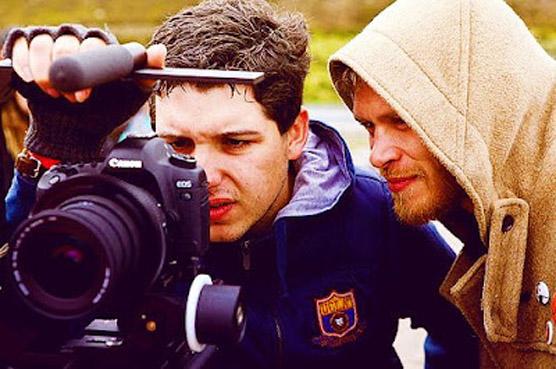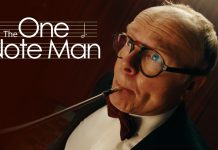The film THE CAPTIVE is out on Monday 25th August, 2014 on DVD and the writer and director of the film, Luke Massey, which stars Joseph Morgan and Matt Ryan, shared his thoughts on the film.
Film and TV Now editor, Lisa-Marie Burrows reviewed the movie and spoke to the director of the film, Luke Massey, to get an insight into the psychological thriller:
LMB: It’s great to speak to you about this film Luke, thank you for taking the time to talk to us. Firstly, I just want to say well done, I thought the film was fantastic. It had me intrigued from start to finish.
LM: Thank you that’s very kind of you.
LMB: Firstly, you are the writer, producer and director of The Captive, how did you come about the idea of this project?
LM: I worked with Benjamin Read who writes graphic novels and he owns a publishing company, film company and a comic which does graphic novels. He originally came up with the idea of it as a graphic novel/comic and then approached me to adapt it with him as a screenplay. Originally it was just one character in the house and we developed it over six months. We developed it with Joe as well (Joseph Morgan who plays A.J.Budd), it was six months writing and then Joe and I spent six months getting into the character as he was off doing Ben Hur in Morocco, so I went over and spent some time with him there. So it was a year’s process before we started filming.
LMB: How difficult was it for you to juggle all of these roles at once?
LM: There was about four of us producing, so as soon we started filming, I didn’t have to do any of the producing work. There are two other guys who edited it with me, so I am getting a lot of credit, but I didn’t really do it all, loads of us were doing it. I am just one of a lot of people. Joe and Matt are such good actors, they kind of direct themselves. I didn’t have to do as much as people think – most of the credit goes to everyone else. I seem to be taking more of the credit than I deserve!
LMB: Now the film has got three different names, (The Captive, Armistice and Warhouse), can you tell us a little bit about that please?
LM: We came up with the title Warhouse and we were quite naïve about it and thought we are going to make a film of it and everyone is going to love it. We went to Cannes with it and to loads of festivals. A company wanted to buy the film and they wanted to call it ‘Armistice’ so we said that’s fine and then the second company said actually we really liked ‘Warhouse’ so we are going to call it that. Then the third company said we don’t like either of them so we are going to call it ‘The Captive.’
It was first released over 18 months ago in America and we are still so busy, so once I have finished editing a film, I’m done with it. You don’t really own it any more.
LMB: Are you ever tempted to look at any reviews of it?
LM: No, I don’t. I think my mum is an intelligent woman and said if you believe if anyone says anything good about whatever you do, then you have to take the bad as well. I don’t think I’m strong enough to take the bad, so I would just rather not take the good.
Thing is, when you make a low budget film, if your company is half decent at what you do, you know the faults with it and the things you would like to improve on with more time and money. The reality is that’s not always the case.
On the last day, we were so far behind and Joe was due to fly to LA and I think we did 45 scenes, which we filmed in 24 hours. People don’t see that side.
The first cut I did of The Captive was three hours long, so I cut a lot out. I worked out I pretty much cut out the length of Reservoir Dogs, which is stupid looking back at it. So people don’t really see that. People don’t really see the 15-hour days for a year you put into something to make it the best film possible, it’s just sometimes really hard, so when you are done with it, the reviews are the last thing on your mind. It is nice on Twitter when people get into contact and say they liked it because it feels more real, but apart from that I don’t really read the reviews.
LMB: So this is your first feature film, how have you found the experience?
LM: Yeah, good. I worked for the BBC for quite a while beforehand and I did my first BBC job when I was 17. I have been paid to do this job now for 13 years so it didn’t feel like it was a really daunting experience. It didn’t feel like we were winging it and because Joe was quite successful before doing it and then afterwards he became really successful, so it never really felt like we were amateurs doing it. I didn’t expect to have so much pressure and feel so connected to the film while editing it. Then you do get that feeling of protecting it and trying to make it as good as possible.
LMB: Whilst watching the movie, my heart was pounding. From the beginning you had a feeling that A. J Budd should have opened the front door and left rather than sit down to eat. Was that the effect you were looking for with the audience?
LM: The idea that Joe and I had, which wasn’t in the script, was that when you have bad stuff happen to you, you always seem to remember something before it happened where you could have gotten out of it, like a fight in the bar or anything that’s bad. You just feel like if I had made that choice then maybe it wouldn’t have been as bad. Joe and I like to think that if he had just opened the door then the film wouldn’t happen and so we wanted that hint of being able to look back. All of my films seem to have a circle where you book end them, where there are cutaways of water at the start and that’s where the film ends.
LMB: How did you find it working on this kind of scale of production, as it was largely shot in one setting? You were in the same place everyday for a year…
LM: It’s hell. It’s not good. In the second film, which we have just finished editing called 500 Miles North, its set up in the Highlands in Scotland so it’s all shot outside and after The Captive, Joe and I said that in the next film we were going to do it all outside and it’s going to be in beautiful surroundings with lakes and stuff. But at the end of doing 500 we were like the next film we are going to go inside again because it’s so much easier. Everyday when we turned up to work in the house (in The Captive) it was reset so it felt like it was a non-stop day everyday.
LMB: Joseph Morgan was great in the film and manages to convey a variety of emotions from confusion, desperation to pure anger, what was it like working with him and the rest of the cast?
LM: I knew Matt for 10 years, who plays Edward and Joe lived with Matt and a load of other actors and they made a short film which they directed and I did the camera and lighting for. Joe and I became really close and we have a similar taste in films, comic and literature, so we decided to make this film and were really good friends. He’s a fascinating actor and so is Matt. They are both so professional and good. I’m not surprised by their success. They’re both really good actors and great fun to be around. All of the crew loved them and they are very grounded. It takes a lot to be an actor to act on your own in a scene and not rely on anyone else. 90% of it is Joe in rooms and he just does an amazing job because even in things like Castaway with Tom Hanks he has Wilson, the ball, so you have got something you can act off and pretend. I can understand why people think it is just a guy in a house, but there is something so subtle in his performance that you see a guy go insane by the end of the film and you just feel sorry for him.
LMB: It’s a great look into the human mind and how tough it is, they way that Budd adapts himself to his surroundings and does what he needs to do, as he slowly almost loses his mind, particularly after being there for two years and he sees the 30 years on the wall of Edward Sterling played by Matt Smith. How hard was it for you when writing it to tap inside the human mind like that?
LM: Joe and I plotted it out between us. All the credit goes to Joe really. He is very thorough in every job I have known him to do. He writes diaries and stuff and he really jumps into the part. What we really wanted to do was explore him in a really subtle way, where there wasn’t a lot of shouting, we just wanted him to slowly deteriorate and because in the flashbacks where you first see Matt’s character you see the end of him where it’s more severe, so we thought to counterbalance that we would have to be a lot more subtle with Joe and it seemed to work. The psychology of it all was down to Joe and the process he wanted to do. I just kept an eye over the film and gave him enough space to act in that environment.
LMB: What is your favourite thing about the film and why do you think people should buy the DVD and watch it?
LM: My favourite thing is Joe and Matt’s performance. I would say to anyone who has ever seen him in things before that was he does in this film is a lot darker and grittier and I think to watch an actor do 90% of a film on their own is interesting. It’s like going to the theatre and watching one person. That’s the best thing about it and the film is a different take on a film like Saw – it’s different to other films out on the market. I don’t really like violence. The older I get, I have gotten more squeamish and that turns me off.
LMB: Are you particularly attracted to these types of films?
LM: I don’t think I will do another film like this ever, with green blood again or zombies! I enjoyed watching it, but you sacrifice a lot to make a film in terms of your personal life. I’d like to make films to show my kids one day and my family, something that’s a part of you. I love The Captive, but I’d be pretty twisted if the characters reflected me in anyway!
LMB: What are your future projects? Can you tell us anything about them?
LM: 500 Miles North is done, so that will be at Cannes Festival next year. I’m doing a film at the end of the year with the same group of people, but I don’t know about the actors, but they will be involved creatively in terms of producing. I am just about to direct my first feature documentary with the BBC, a football documentary. I’m obsessed with football and films, so it’s nice to do something I am passionate about and to work with the BBC and do something on football.
Talking about The Captive is almost like revisiting an old friend. When my older brother and I were younger, when we finished school everyday we would go into our local HMV and spend hours everyday looking at stuff. Then once a week, we would buy a VHS and watch it every night for a week, like Pulp Fiction, until we could get another one, so to have a film in HMV makes me really proud of that and makes me think of me and my brother when I see that. If someone had told me when I was younger that I would have a film in a shop, I would have been really touched and that means a lot to me.
LMB: Many thanks for your time today. It was great speaking to you.
LM: Thank you very much to you too.
The Captive is available to buy on Blu-Ray, DVD and VOD from Monday 25th August, 2014 on Amazon.





























